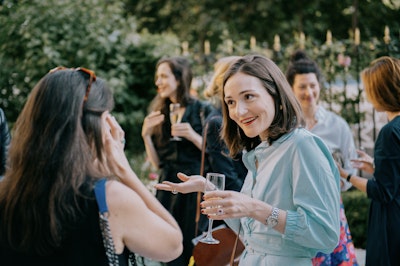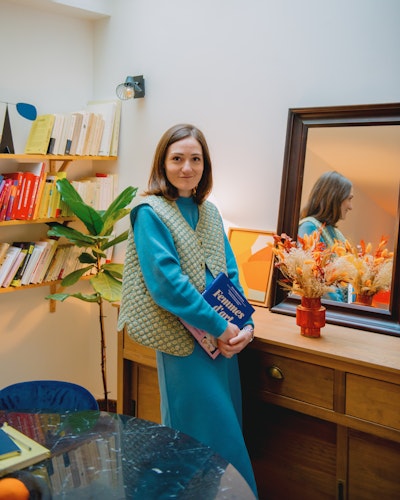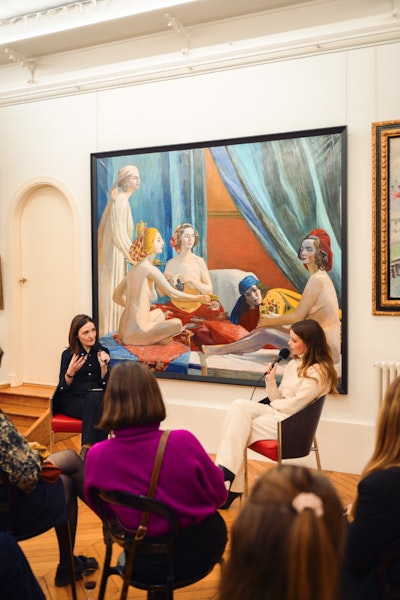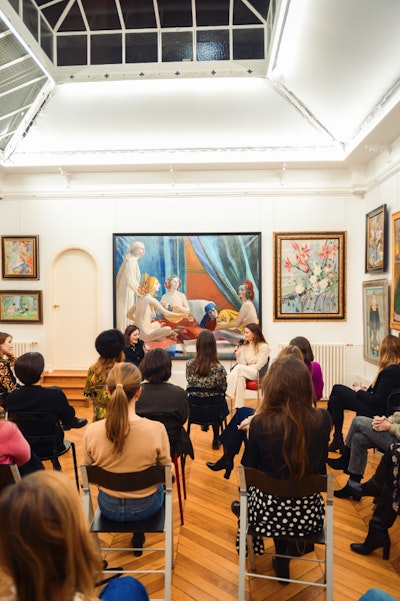“The art of the 21st century will be feminine!”, says Marie-Stéphanie Servos, and she has already contributed to getting there. The art lover from Paris has created an entire universe for women in the art world and in the creative industries. Her mission: to give them a voice. "Femmes d’art" started four years ago, appropriately enough, with a podcast for this purpose, followed by her own magazine, a club, and a book. Bringing women together and promoting sisterhood was a not insignificant goal in all of this. We talked to her about how she got there, what she thinks has already happened, and how much still needs to be done.
Jessika Rauch: Four years ago, you decided that France needed a magazine dedicated to women working in the art world. Why do you think France still needs such a media today, and maybe not just France?
Marie-Stéphanie Servos: When I started Femmes d’art in 2019, as a journalist and art lover, I asked myself where all the female artists were in the museums and galleries. At that time, there were no resources in French, such as podcasts, Instagram accounts and magazines, dedicated to the topic. Instead of works by female artists on museum walls or in big galleries, women tend to be present as muses or models in art, mostly nude, by the way. That inspired me to find answers, so I started the podcast first, followed by the magazine and a club for women in the art world. On one hand, I thought it was important to get these answers, but on the other hand, I wanted to put great female contemporary artists in the spotlight. I think even though their situation is better today, there is still a need for this work to be done worldwide so that women can be seen, considered, and paid in the same way as male artists.
JR: Why do you think women in the art world need that voice you give them?
MSS: Because they are simply not seen or heard enough. Even though the situation has improved, there is still a need for female artists to be supported. It still happens that women of a certain age, when they may become mothers e.g., are less interesting to a gallery owner or other professionals in the sector. It seems less important to invest in them because they may be leaving their jobs for a while, which is far from fair, nor is it justified. Even though there are nowadays major exhibitions by female artists, we need more retrospectives that showcase their work. We need institutions that invest in their works and include them in their collections. This is the way to make the world more and more equal.
JR: You have met many interesting and strong women especially over the past four years, and most likely before. How do female players in the art world impress you, and what do they possibly all have in common?
MSS: What I see again and again when I meet these women is that they are absolutely passionate and truly, genuinely dedicated to art. This is really inspiring. And I think there's also a true sisterhood that just strives to grow, especially among female artists.
JR: As a journalist, curator, entrepreneur – which role do women play in your work life as a whole, also beyond Femmes d’art?
MSS: I am in contact with women at work every day, whether it’s for
Femmes d’art or as an editor in chief of a women’s magazine. A lot of women are creating so many great things, projects, collaborations. There’s a real plenitude, and this is really inspiring.
JR: You are quoted with “The art of the 21st century will be feminine!”, isn’t our century already feminine?
MSS: The whole world is still very male! While much is said and shown about women, and progress has been made, we still have a lot of work to do. And I think we've only just begun to make the 21st century feminine…
JR: Media in all its forms contribute to creating a shared collective memory of women in art, and they undoubtedly have the power to make a difference, to influence society. We experience this every day. How can the art world on one hand, and the impact of powerful media tools on the other hand, help to make the world a fairer and more equal place, while changing the art market too?
MSS: I think that artists play a big role in the world we live in, with all its difficult and fearful issues, and all the challenges we are facing. Not only do they speak differently about this world and this society, as the media can, but they can also share their creativity with us, helping us find new ways of thinking and living. For me, the fact that they can generate joy and inspiration, and other emotions is very important. In a world where climate change, wars, economic problems, and inequality make headlines every day, we need art more than ever.
When it comes to women and their ability to create collective memory, the art world has an important role to play! Because without showing the artists, telling their stories, talking about their creations, no one would be able to remember everything they could and can give to our world. Women made great contributions to the art world, but they were and still are forgotten.
The art world has the responsibility to take action to highlight and support the work of women, as I mentioned earlier. How can media contribute to this? Simply by shining a light on their work and its challenges, while highlighting what the art world needs to do to make this possible.
JR: What do you say to those who still consider the art world to be very elitist and not "democratic", i.e. openly accessible?
MSS: In a way it's true. But for me there is not just “one art world”, and many professionals, gallery owners and artists are very open and inclusive. The art world still has a lot of work to do to seem less elitist, but I'm sure this new generation of professionals, content creators, artists, gallery owners and historians really want to help reinvent the art world to make it more accessible. I am optimistic that this can be achieved.
JR: Who do we meet at your club nights, “soirées du Club Femmes d’art” and what are the topics of your next soirée?
MSS: The Femmes d'art events are a way to promote sisterhood and inclusion in the art world. And the women who come to these events are women we meet along the way, from the art world and the creative industries. When I launched Femmes d'art, I was surprised by how many asked me to do these kinds of events because they felt isolated. That was a surprise for me! But obviously there are many women in the art world who don't have the opportunity to collaborate and meet. So, our concept is to facilitate a meeting, and to do it in a beautiful place and context. Sometimes it's a lecture, a panel discussion, or a podcast recording, sometimes it's about an artist, an exhibition...
JR: Which women haven’t you had at one of your soirées yet that you would love to invite, or wish to become a member of your club?
A woman of our time, and one of the past, who is no longer with us.
MSS: (smiles) One woman from the past I would have liked to meet, and invite is Hilma af Klint. I would have so many questions for her about her work ... And I would probably like to convince her to change her mind and not hide her work for so long! As a woman from our time, I would love to invite Marina Abramovic, whom I had the pleasure to interview for my book Femmes d'art. I still have so many questions for her....
JR: You have continuously developed your concept and media offer since the start. How did technology and new forms of communication inspire respectively help you to spread the word, and what’s next?
MSS: New technologies, and especially social media, are a great way to launch a project, and make it known. But it's also a real challenge because the algorithms change often, which makes it harder for us to be seen. What's coming next? I really don't know! I don't think anyone could have imagined how technology and social media would change our world. So, the future will certainly surprise us, and we will adapt to continue to be able to represent women's voices.
JR: Marie-Stéphanie, are you a feminist? And what exactly does that mean for you?
MSS: Of course, I am. That's not even a question for me. I think everyone should be a feminist because that means we agree that we are all equal. We can be women, transgender, or otherwise part of LGBTQ+, and yet we are all the same. Being feminist is just as important as being against inequality, poverty, violence, etc. Because that is everything feminism is fighting against.
Interview by Jessika Rauch



